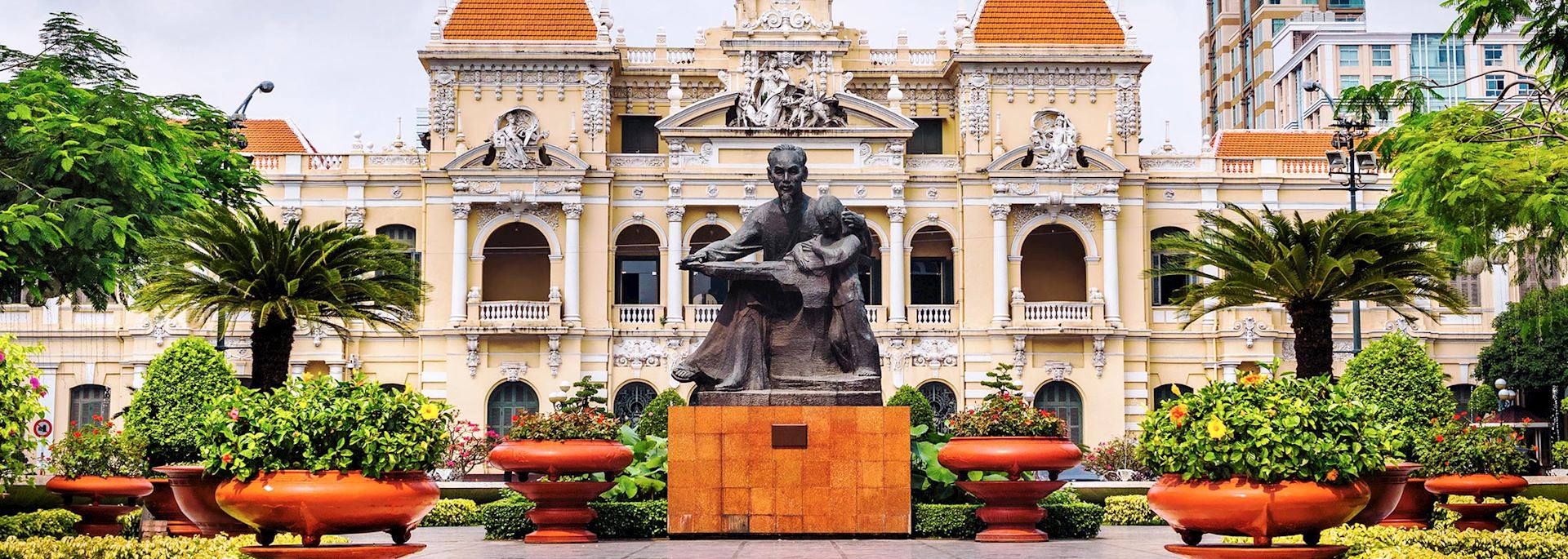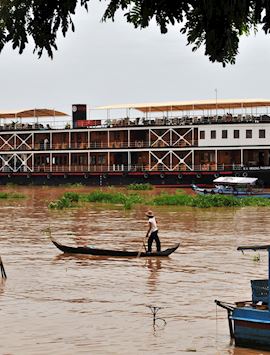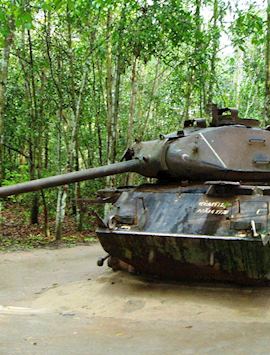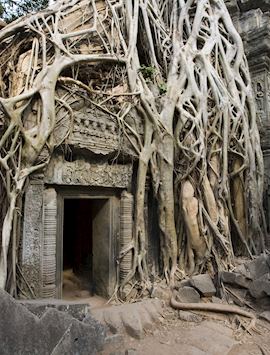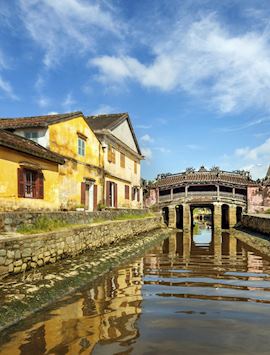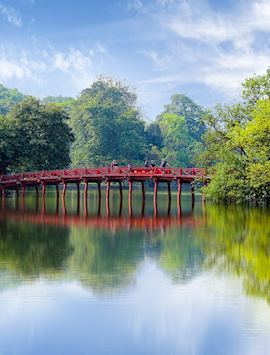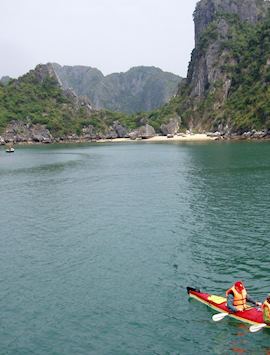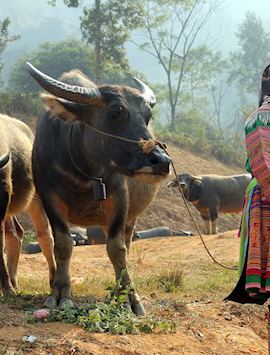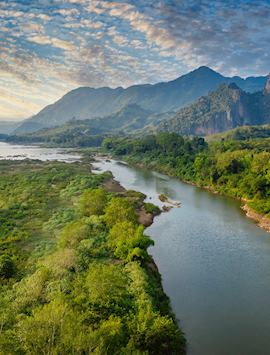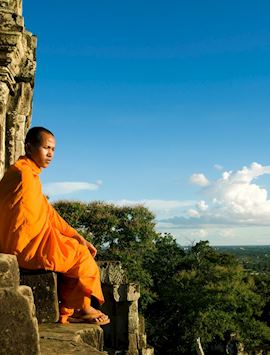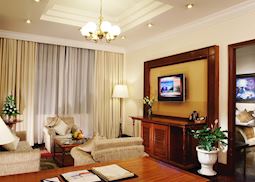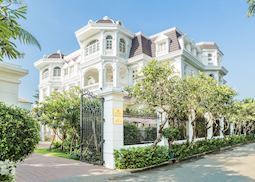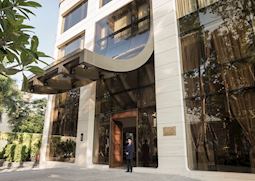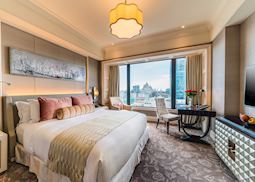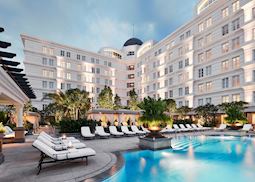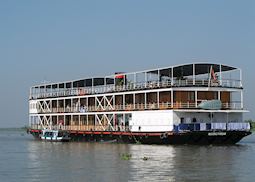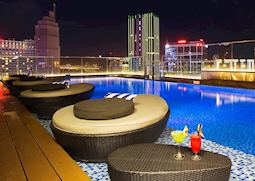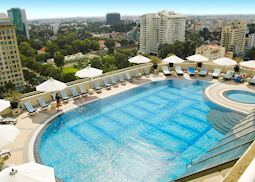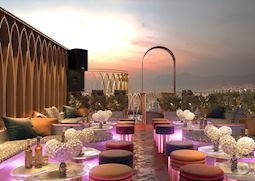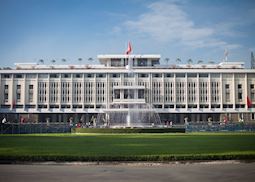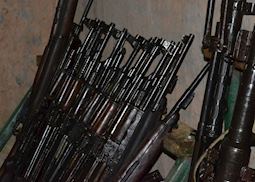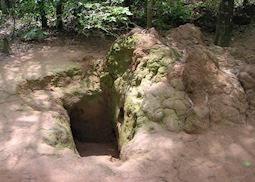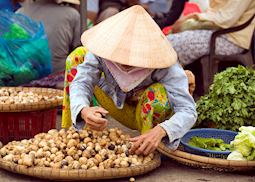Jump to:
Take a photo of Ho Chi Minh City, and you’ll find it out of date within weeks. Once a city devastated by war, it’s now becoming a modern metropolis, buzzing with contemporary hotels, modern restaurants and shops. Wander its streets and you’ll discover it still retains character, however, with French-colonial architecture, flourishing markets and peaceful temples. Officially renamed in 1976 to Ho Chi Min city, it’s still referred to by the locals as Saigon.
Vietnam specialist AlexExploring Ho Chi Minh City, the bustling and vibrant hub of Southern Vietnam, will always yield a sort of “East meets West” vibe as you meander through the chaotically organized streets and markets flooded with life.
Things to see and do in Ho Chi Minh City
See Ho Chi Minh City like a local
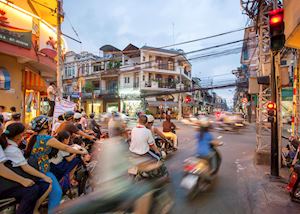 As the evening closes in, Ho Chi Minh City’s inhabitants finish work and head out to enjoy their city. Taking a tour with a Vietnamese city-dweller, you can dip behind the scenes of Ho Chi Minh City to spend an evening like a local. Your guide will pick you up from your hotel on a Vespa motorbike — the only way to negotiate Ho Chi Minh City’s traffic. With a backrest and handle bars for support, they’re a comfortable way to travel.
As the evening closes in, Ho Chi Minh City’s inhabitants finish work and head out to enjoy their city. Taking a tour with a Vietnamese city-dweller, you can dip behind the scenes of Ho Chi Minh City to spend an evening like a local. Your guide will pick you up from your hotel on a Vespa motorbike — the only way to negotiate Ho Chi Minh City’s traffic. With a backrest and handle bars for support, they’re a comfortable way to travel.
Weaving in and out of the streets, you’ll stop at some local haunts along the way. Finding the best seafood stall or best pancake house, you’ll be able to eat alongside local families and gossiping friends. The evening will finish with an interesting journey through narrow alleys and staircases to one of Ho Chi Minh City’s hidden coffee bars. Acoustic music, sometimes in candlelight, provides an intimate setting to enjoy a nightcap.
Stroll the boulevards of District One
Whilst much of Ho Chi Minh City has grown sporadically, streets sprawling out from its heart to meet the demands of a growing city, District One has a different feel. Planned in detail by French colonialists in the late 19th century, it incorporates wide, tree lined boulevards and frequent parks. Stroll the streets and you’ll find cosmopolitan cafés and excellent shopping.
It’s also where you’ll find some of the key sites. The Saigon Opera House is a lavish display of French colonial architecture. Book the popular A O show to see traditional music, acrobatics and dance tell the story of rural Vietnamese adapting to urban development. Nearby is the Central Post Office, a well-preserved lemon yellow building designed by Gustave Eiffel. Pop inside and you’ll find huge hand-painted maps that depict Ho Chi Minh City in 1892.
Dine overlooking Ho Chi Minh City in Bitexco Financial Tower
The highest point on Ho Chi Minh City’s skyline, Bitexco Financial Tower is at the heart of the city’s financial quarter. Designed by Carlos Zapata, its 68 stories are inspired by the national flower, the lotus — although it’s a little tricky to see the resemblance. A slick, glass building, its teetering helipad is the focal point, looking like a CD poking out of a CD player.
Predominantly office space, floors 49-51 are open to visitors. The Skydeck is a viewing platform on the 49th floor with 360 degree views from the floor-to-ceiling windows. There’s a relaxed coffee shop with seating lined up facing the view. On the floor above is EON 51, a fine dining restaurant serving Asian and Western food, but before you eat you could watch the sunset from the EON Heli Bar, with a team of expert mixologists, the cocktails here come recommended.
Visit the War Remnants Museum
Originally named the Museum of Chinese and American War Crimes, the War Remnants Museum is a harrowing but fascinating account of the Vietnam War. As its original name implied, the information is arguably one sided, but the documents and artifacts tell their own story. The collection includes tiger cages, where members of the Viet Cong were kept. Outside is a collection of US armored vehicles, weapons and aircraft.
Legendary war photographer Tim Page has curated a captivating exhibition, Requiem, which shows the work of war photographers of the era — many of whom were killed in action. There is also a more upbeat display of posters and photos of anti-war movements around the world.
Step into the Cu Chi tunnels
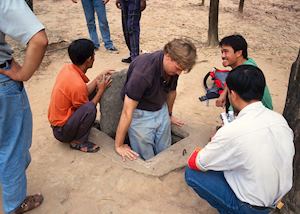 About an hour and a half outside Ho Chi Minh City lie the sprawling network of tunnels dug by the Viet Cong during the French Indochina wars. They were later expanded, housing legendary underground communities during the 1960s when American troops were deployed across the country. In their prime, they stretched from Ho Chi Minh City to the Cambodian border, helping the Viet Cong control a vast rural area.
About an hour and a half outside Ho Chi Minh City lie the sprawling network of tunnels dug by the Viet Cong during the French Indochina wars. They were later expanded, housing legendary underground communities during the 1960s when American troops were deployed across the country. In their prime, they stretched from Ho Chi Minh City to the Cambodian border, helping the Viet Cong control a vast rural area.
At the site it’s possible to watch original film footage of the tunnels, illustrating their use as hospitals, schools and communication channels. Part of the tunnel has been enlarged, enabling visitors to step underground. Snaking up and down for 50 m (164 ft), the unlit tunnel is 1.2 m (4 ft) high and 80 cm (2.5 ft) wide.
Explore Chinatown
Cholon, Ho Chi Minh City’s Chinatown, is a city within the city. Dating back to the 18th century, Chinese minorities fled here to hide from the Tay Son. They stayed and built a community selling Chinese products to the Vietnamese. Start in Bin Tay market and you’ll find wholesalers selling everything from silk to plastic buckets, as well as artisans selling embroidered fabric and lacquered wooden objects.
Outside, the streets are lined with street hawkers and small authentic restaurants selling dishes with exotic ingredients including dried seahorse and salted duck eggs. Step away from the bustle into one of the many temples and you’ll find a little pocket of calm. The most revered is the Thien Hau Pagoda, built to worship the goddess of the ocean — particularly important to a community of traders who arrived by sea.
Best time to visit Ho Chi Minh City
It’s possible to visit Ho Chi Minh City year round but it’s a good idea to be aware of Vietnam’s three microclimates. November to April, with dry days and low humidity, is the best time to go. It’s also the driest time for the rest of Vietnam too. March to May can be very sticky with temperatures reaching 102°F (39°C). Showers are frequent from May to October but with intermittent sunshine, but it’s worth considering for good value hotels.
Festivals, events and seasonal reasons to visit
- The lunar new year, known as Tet, tends to fall in late January or early February. Across Vietnam homes are decorated with strings of lights and flags. Gifts are given and homes are filled with flowers and small potted trees. Ho Chi Minh City seems to turn yellow — considered a lucky color to welcome the new year. Travel can be busy during this time and most restaurants and shops close.
- September 2nd each year marks the Vietnam Declaration of Independence from France in 1945. Ho Chi Minh City is decked in thousands of Vietnam flags as locals enjoy the public holiday. An impressive firework display is set off over the city.
who's been there

Start planning your tailor-made trip to Ho Chi Minh City by contacting one of our Vietnam specialists
-
617-223-4521617-223-4120
- Make an inquiry
Suggested itineraries featuring Ho Chi Minh City
Our itineraries will give you suggestions for what is possible when you travel in Ho Chi Minh City, and they showcase routes we know work particularly well. Treat them as inspiration, because your trip will be created uniquely by one of our specialists.
Places near Ho Chi Minh City
- Cai Be 55 miles away
- Cat Tien National Park 61 miles away
- Can Tho 81 miles away
- Mekong Delta 81 miles away
- Mui Ne & Phan Thiet 97 miles away
- Chau Doc 108 miles away
- Dalat 144 miles away
- Con Dao Islands 144 miles away
- Central Highlands 160 miles away
- Buon Ma Thuot 161 miles away
- Phu Quoc 188 miles away
- Nha Trang 198 miles away
- Kon Tum 263 miles away
- Quy Nhon 269 miles away
Photos of Ho Chi Minh City
Accommodation choices for Ho Chi Minh City
We've selected a range of accommodation options for when you visit Ho Chi Minh City. Our choices usually come recommended for their character, facilities and service or location. Our specialists always aim to suggest properties that match your preferences.
-
![Colonial Suite, Majestic Hotel, Saigon]()
Hotel Majestic
Ho Chi Minh City -
![Villa Song, Saigon]()
Villa Song
Ho Chi Minh City -
![Hotel des Arts, Saigon]()
HĂ´tel des Arts Saigon
Ho Chi Minh City -
![Opera King room, Caravelle]() Responsible ChoiceWe've hand-selected a range of tours and stays across the world that go above and beyond to be a force for good by supporting local businesses, educating staff, challenging local norms, or promoting conservation and biodiversity efforts. Your Responsible Choice helps increase the positive impact of your trip.
Responsible ChoiceWe've hand-selected a range of tours and stays across the world that go above and beyond to be a force for good by supporting local businesses, educating staff, challenging local norms, or promoting conservation and biodiversity efforts. Your Responsible Choice helps increase the positive impact of your trip.Caravelle Hotel
Ho Chi Minh City -
![Swimming pool, Park Hyatt, Ho Chi Minh City]()
Park Hyatt Saigon
Ho Chi Minh City -
![RV Mekong, Siem Reap]()
Pandaw River Expeditions
Ho Chi Minh City -
![Pool at night]()
Liberty Central Saigon Citypoint
Ho Chi Minh City -
![Rooftop pool]()
Sofitel Plaza Hotel, Ho Chi Minh City
Ho Chi Minh City -
![Sky Bar, La Siesta Premium Saigon]()
La Siesta Premium Saigon
Ho Chi Minh City
Ideas for experiencing Ho Chi Minh City
Our specialists seek out authentic ways to get to know the places that could feature in your trip. These activities reflect some of the experiences they've most enjoyed while visiting Ho Chi Minh City, and which use the best local guides.
-
Retracing the Past ![Reunification Palace]()
Retracing the Past
Retracing the Past
Visit what were some of the most important places in Ho Chi Minh City during the Vietnam War.
View details -
Ho Chi Minh City After Dark ![Vespas in Saigon]()
Ho Chi Minh City After Dark
Ho Chi Minh City After Dark
This is a fun and authentic way of discovering Ho Chi Minh City, and although you will have your own driver, we ask that you are confident at riding pillion on a Vespa scooter.
View details -
Ho Chi Minh City's Secret Alleys ![Rifles left over in the weapons house]()
Ho Chi Minh City's Secret Alleys
Ho Chi Minh City's Secret Alleys
This tour of Ho Chi Minh City’s alleys will give you an authentic insight into the daily lives of those that reside and work in this particular district of the city. It finishes at a previously covert location that was used during the war to store weapons.
View details -
Cu Chi Tunnels Excursion ![Tunnel entrance, Cu Chi, Saigon]()
Cu Chi Tunnels Excursion
Cu Chi Tunnels Excursion
Go underground into Cu Chi’s hidden network of Viet Cong tunnels, bunkers and field hospitals. Dug during the French-Indochina wars, they were expanded during later conflicts and proved to be a constant thorn in the side of the Saigon regime.
View details -
Ho Chi Minh City Tour ![Street market seller in Ho Chi Minh City]()
Ho Chi Minh City Tour
Ho Chi Minh City Tour
This half-day tour will take in the main sites of Ho Chi Minh City including Rue Catinat, Notre Dame Cathedral, the Reunification Palace and the Museum of War Remnants.
View details
